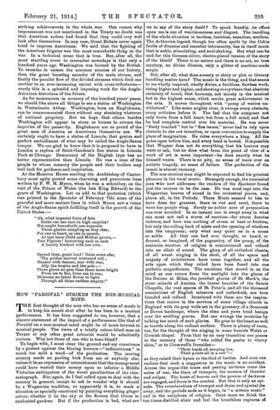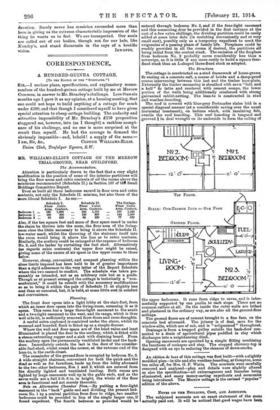HOW "PARSIFAL " STRIKES THE NON-MUSICAL MIND.
fr HE first thought of the man who has no sense of music is
to keep his mouth shut after he has been to a musical performance. It has been suggested to me, however, that a sincere statement of the impact of a performance like that of Forayed on a non-musical mind might be of some interest to musical people. The views of a totally colour-blind man on Turner or any other great colourist would be admittedly curious. Why not those of one who is tone-blind P
To begin with, I must clear the ground and my conscience by a protest against the blazing horrors—" indiscretions" is much too mild a word—of the production. The moving scenery needs no parting kick from me or anybody else, unless it be an expression of astonishment that the management could have wasted their money upon so inferior a Middle Victorian anticipation of the worst peculiarities of the cine- matograph. Nor, again, do I feel called upon to deal with the scenery in general, except to ask in wonder why it should be a Wagnerian tradition, as apparently it is, to mark a situation as specially emotional by painting everything ginger colour, whether it be the sky or the flowers that bloom in ;indented gardens. But if the production is bad, what are
we to say of the story itself P To speak frankly, its effect upon me is one of wearisomeness and disgust. The handling of the whole situation is tactless, tasteless, senseless, soulless. The Arthurian legend, though too often spoilt by the Celtic' faults of dimness and essential inhumanity, has in itself mach that is noble, stimulating, and soul-shaking. But what can be said for this German-silver, electro-plated version of the story of the Grail? There is no nature and there is no art, no tree mystery, no divine illusion, only a glitter of machine-made magic.
But, after all, what does scenery or story or plot or literary handling matter here? The music is the thing, and that seems to me wholly inspired, wholly divine, a faultless, flawless work, rising higher and higher, andshowing everywhere that absolute certainty of touch, that harmony, not merely in the musical but in the highest sense, which marks great achievement in the arts. It moves throughout with "pomp of waters no. withstood." Like some mighty river, it sweeps every obstacle, every criticism before it. You feel that the composer not only wrote from a full heart, but from a fall mind, and that he had complete control over his material. He was never "finely touched" but to "fine issues," never had to rely upon rhetoric to eke out invention, or upon convention to supply the place of imagination. He rules everywhere a king. All the gates open before him, and every head is bowed_ It is possible that Wagner does not do everything that his hearers may want or ask, but he does what from the point of view of a work of art is more important—he does exactly what he himself wants. There is no pity, no sense of tears over an artistic tragedy, no sense of failure. The perfection of the music is almost uncanny.
The non-muaical man might be expected to find his greatest pleasure in the vocal music. Strangely enough, the unmusical man who now addresses the readers of the Spectator found just the reverse to be the case. He was most rapt into the Wagnerian heaven of sound in the orchestral pieces, and, above all, in the Prelude. There Music, seemed to him to have done her greatest, there to riot and revel, there to wave her purple wing. Surely no nobler note of preparation was ever sounded. In an instant one is swept away in what one must not call a storm of emotion—for storm denotes violence, and here was nothing of stress or heat or friction, but only the rolling back of mists and the opening of windows into the empyrean; only what may quiet us in a scene 80 noble. All that one had ever thought, or heard, or dreamt, or imagined, of the pageantry, of the pomp, of the sensuous emotion of religion is concentrated and refined into an elixir of sound. The glory of all cathedral chants, of all sweet singing in the choir, of all the apace and majesty of architecture have come together, and all the arts upon which they relied have been fused into one pathetio magnificence. The emotions that crowd in on the mind as one enters from the sunlight into the gloom of the Duomo at Milan, the jewelled glories of St. Mark's, the stone miracle of Amiens, the lucent beauties of the Sainte Chapelle, the vast spaces of St. Peter's, and all the thousand associations of English minaters and cathedrals, are here blended and refined. Interlaced with them are the inspira- tions that centre in the services of some village church in England with its grey walls set in the greenery of a Somerset or Devon landscape, where the elms and yews bend benign over the swelling graves. Bob one wrongs the musician by talking too much of such glories. He goes to the heart as well as travels along the radiant surface. There is plenty of room, too, for the thought of the singing in some humble Welsh or Cornish chapel. From that by an easy transition one passes to the memory of those "who rolled the psalm to wintry skies," or to Cromwell's Ironsidea- " Their heads all stooping low,
Their points all in a row"—
as they raised their hymn to the God of battles. And soon one realizes that such a suggestion in the music is no accident. Across the organ-like tones and pealing anthems come the notes of war, the blare of trumpets, the menace of thunder and eclipse. The hosts of heaven and the powers of darkness are engaged, and tierce is the combat. But that is only an epi- sode. The reverberations of trumpet and drum and cymbal die away, and the prelude ends as it began, in "a solemn music" audio the antiphons of religion. Once more we drink the ten-times-distilled, elixir and feel the breathless raptures of
devotion. Surely never has musician succeeded more than here in giving us the extreme characteristic impression of the thing he wants us to feel. We are transported. Our souls are called out of our bodies, though not for our bale, like Hendry's, and stand discarnate in the rays of a beatific















































 Previous page
Previous page